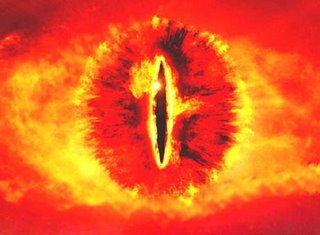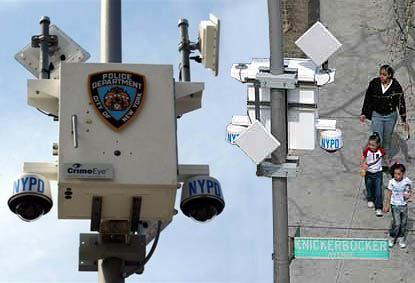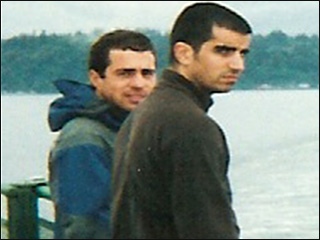
"Look out a few more years and nano-cameras as small as grains of sand will create a world in which the wind has eyes.
Fingerprint-scanning doorknobs and steering wheels could know their users by touch.”
---Adam L. Penenberg, The Surveillance Society
"The powers of vision and information are expanding exponentially in the hands of the people, far faster than they are being acquired by government."
---David Brin, The Transparent Society
Nowadays surveillance cameras have become ubiquitous and omnipresent. The picture below is one of a pair of cameras (apparently, they now come in pairs) in New York City. Each one of them can swivel round 360 degrees, look beneath themselves and zoom-in so well that, reportedly, they can read a cigarette pack from as far as 1,000 feet away. Their opaque spherical glass casing and their height (30 feet up) doesn't allow one to see where the cameras are pointed or what the camera are looking at.
Most people don't mind them. They know they are there for their own protection.
Surveillance cameras are never to be abused by their operators, each of whom can be trusted individually - just as governments are - not to abuse such technology to engage in despicable or outright illegal behavior.
Right?
First and foremost, those electronic "eyes" are there for the good of the people.
Surveillance cameras, in many towns in Britain, the developed world's leader in video surveillance, have of recent years now come equipped with a "mouth" too.
They help make better persons out of people - they are a nation’s good conscience.
If some distracted, neglectful, or otherwise temporarily misguided citizen happens to drop some trash, a cigarette butt, or a hamburger wrapper, or whathaveyou out into the street, a booming voice is there to tell him or her to pick it up.
Local communities in Britain have been pushing, too, for more surveillance. Reportedly, the feeling is that even though some of those communities might be located in some neighborhoods, or some little villages that have no history of violent crime, people there feel they'll be safer if they have got some of those benevolent surveillance cameras around. Those ubiquitous cameras are mounted everywhere, in the streets, in public parks, in sports stadiums and shopping malls. David Brin postulated a "Moore's law of cameras,” by which cameras would be "halving in size, and doubling in acuity and movement capability and sheer numbers, every year or two."
NOW, YOU TOO, DEAR READER, CAN BE PART OF A BENEVOLENT SURVEILLANCE SOCIETY AND HELP MAKE OUR WORLD A WORLD THAT IS SAFER, FREE, OPEN AND EXCITING. A BETTER WORLD ORDER THAT WORKS BETTER FOR ALL.
Some of that technology is already here at your fingertip: it's called cell phone surveillance.
The potential "passive" benefits of cell phone technology are tremendous, of course; the Missouri Department of Transportation, I understand, is spending some $3 million annually on a program to monitor the movements of individuals on highways via their cell phones --- almost everyone has a cell phone, and since it isn’t subjected to any cumbersome and pointless individual’s consent, that's a lot of potential data points, and data can be tracked almost anywhere on the whole road system.
The traffic community has been really excited for quite some time about the possibility of being able to use cell phones to track vehicles. But those are just passive benefits. You, as a conscientious networked citizen, can help make our benevolent civilization work a lot better than that – take an active part in it – that wondrous technology is yours to use: YOU TOO can take picture of anything or anyone suspicious with you camera phone and report it to the authorities. Keep an eye on your fellow citizens - help them stay on the straight path.
When a celebrity gets drunk and makes a scene, bystanders can snap a picture and post it on the Internet.
Never be afraid to capture suspicious people on your cellphone’s camera. Do you feel yourself, say, the victim of sexual harassment? Become a Cell Phone Vigilante:
Join Holla Back NYC, the website encourages women to photograph sexual harassers and post the photos for the world to see.
Help people get back on the straight and narrow.
Last year, the Bruin Alumni Association raised concerns, on its Web site, about professors who use lecture time to press suspicious positions against President Bush, the military and multinational corporations, among other things. Patriotic student-citizens were offered up to $100 per class to supply recordings and notes of any such suspicious activities.
But good citizens do it for free. Learn how to become an effective NSA’s responsible citizen. And, kid, this is for you too: NSA for Kids and FBI for 5th graders. Remember: If you see something, say something! Is your elder brother secretly smoking pot? Has some Muslim immigrant been moving into your neighborhood? You know what to do. If you do not have a camera phone yet, ask your parents.
The FBI released a bulletin last August, including photographs of two men snapped by a ferry employee who thought the pair had been acting suspiciously aboard Washington State ferries.
According to the FBI, they had been trying to identify the men through "normal law enforcement channels." But neither man is considered a suspect nor has either been charged with a crime. Fortunately, concerned citizens, like you, can act. Increased vigilance of your surroundings is still the best remedy to keep Society safe even if it makes potentially innocent Muslims feel uncomfortable or targeted.
Take an active role in your world and help bring about a brave new civilization, free, open and exciting.
Transparency is the foundation of such a new civilization. And no honest god-fearing citizen should fear it… unless… of course... one has something to hide.
You do not have anything to hide, do you?
The right against unsanctioned invasion of privacy by the government, corporations or individuals has been part of many countries' privacy laws, and constitutions.
But such privacy has now become a relic of the past as it is voluntarily being relinquished nowadays in exchange for many of its obvious benefits. And while the separation between public and private sectors becomes less defined and privacy becomes more and more of an elusive thing, the fact of the matter is that no honest citizens should have any apprehension over giving personal information about themselves. Many do so easily enough when invited to do so (often for advertising purposes) in order to have a chance of, say, winning a prize, or in the name of "transparency" and a "free and open" society, or just simply out of vanity or because they just simply want the world to know about them.
To be sure this is the Information Society, and the “Net” touches nearly every part of people’s lives. IP addresses and computer habits of users are recorded to help improve their experience. And why would any truthful and honest person object to anyone monitoring their activity on a network?
Who are you?
Where are you posting from?
What’s the makeup of your household?
Who are you with?
Where have you been?
What did you do?
What Web sites do you visit?
What do you download?
What do you write in your e-mails?
The All Seeing Eye
Posted by
Tom Bombadil
on
10/20/2007
Subscribe to:
Post Comments (Atom)














3 comments:
Interesting post about privacy here by Dan Geer - the transcript of a speech he delivered on May 20, 1999, at the SmartCard Forum in Washington, D.C., in a debate setting.
While I don't agree with absolutely everything the speaker said, I find that he did raise there four very pertinent points - I don't known whether there were further developed in the ensuing debate but it makes a good draft of some of the issues at stake:
1. Privacy as a precondition to a coherent self
quote: Since "philosophical and legal analysis has often identified privacy as a precondition for the development of a coherent self,"[4] one must conclude that it is a mortal peril to give up privacy.
----The architecture of Identity and social impact theory: Interesting! Plenty of things to think about here - It would deserve to be developed further - beginning with the notion of "self" and "identity," and the phenomenon of "normative influences."
2. Utopia or Dystopia? Is living in a global "small town" all what it's cracked up to be?
quote: It is said that the wonderful thing about a small town is that you know everyone, while the terrible thing about a small town is that they all know you. Indeed, a coherent if nostalgic argument for a "transparent society" can be made, one where there are no secrets, where there is no privacy, where everyone knows everyone else's business, where unsolved crime is very nearly impossible, where neither need nor triumph is invisible, a place where everything that is not self-incriminating is therefore public.
----I am not so sure. Living in a small town - is it heaven or hell? Anyone who has lived in a small town will tell you it can be a little bit of both - and oftentimes more hell than heaven (depending on the town.) The Sartrean hell of No EXIT comes readily to mind: L' enfer, c'est les autres("Hell is others"). As does the New Testament (Mark 6:4-6, Matthew 13:57-58, Luke 4:23-24, and John 4:44) and the Gospel of Thomas: "No prophet is accepted in his own village; no physician heals those who know him."
3. Would a Transparent Society succeed in safeguarding itself from the very same failing that has been undermining our societies? What if it didn't?
quote: If the reason I reject the transparent society is that I acknowledge my inability to sufficiently police its stronger members, then the most important thing I can do is to protect my privacy — and, frankly, at all costs. The loss of privacy is irreversible, for information is never un-revealed. Privacy is therefore the paragon of Hume's conjecture: Few liberties are lost all at once. In the face of the snowballing bigness of the institutions of globalized human life, we must reserve privacy rights explicitly so that we may misrepresent ourselves to those against whom we have no other defense, against those for whom our name is but a label on data collected without our consent.
4. Is the choice really between "One Big Brother" or "Lots of Little Brothers"?
quote: A wise man of my acquaintance, a career man in federal law enforcement, reacted to my arguments by telling me that I was typically naive. He said that my choice is not between Big Brother or no Big Brother; rather, it is between one Big Brother and lots of Little Brothers. He suggests that I think carefully before I choose.
----Doesn't seem like much of a choice to me. I don't know whether the speaker is "typically naive," as allegedly his friend claimed he was, but I can't help but point out here at an equally "typical" lack of imagination on the part of this friend. It smacks of the "devil's choice" - a metaphor to describe a choice that arises in circumstances where two available options are both unwanted and perverse - its purpose is often about forcing one's choice in accepting what is presented as a lesser of two evils.
BIG BROTHER AND THE WEB
Many ISPs sell their visitors semi-anonymous website visitation records to outfits like Compete. It's estimated that they make about $5 per user monthly from selling your clickstream data. No ISPs admit to the practice. (link)
What use is made of users' IP address and private informations by unscrupulous ISPs and/or potentially whimsical or domineering webmasters are all extension into Cyberspace of the same Privacy Invasion issue.
Anonymity and pseudonymity exist online as in the world at large for good reasons. (e,g. : All of the Federalist Papers were signed by Publius - a pseudonym representing the trio of James Madison, Alexander Hamilton, and John Jay.) While I respect the opinion of those who prefer transparency, I also feel compelled to respect the preference of those who want to safeguard their privacy, whatever their reasons might be. Furthermore, where made available - that is when visitors are invited to participate on a forum or on a network with the freedom of using, as they so chose, either their real name or a handle (if they want to keep their identity confidential) - for a network to publicly display, after the fact, and retroactively, the IP address of all comments left overtime by visitors who had been trustingly posting on such network, constitute a serious invasion of privacy. Personal tracking really bothers some folks, and they don't necessarily need to be up to something shady either.
Consumer advocate groups, including the Consumer Federation of America, the World Privacy Forum and the Center for Democracy and Technology, collectively called, just recently, for a "do not track list" intended to protect Internet users from having their online activities unknowingly tracked, stored and made publicly available or accessible to marketers and advertising networks, without the user's informed consent.
This is from their press release:
Across an ever-growing array of electronic devices, from the Internet to mobile devices and beyond, consumers leave behind a vast amount of behavioral information that is being tracked and targeted without their knowledge. This "behavioral tracking" -- the practice of collecting and compiling a record of individual consumers' activities, interests, preferences, and/or communications over time -- places consumers' privacy at risk, and is not covered by federal law.
On August 28, 2007, the World Organization for Human Rights sued Yahoo for allegedly passing information (email and IP address) with the Chinese government that caused the arrests of writers and dissidents. The suit was filed in San Francisco for journalists, Shi Tao, and Wang Xiaoning.
Post a Comment